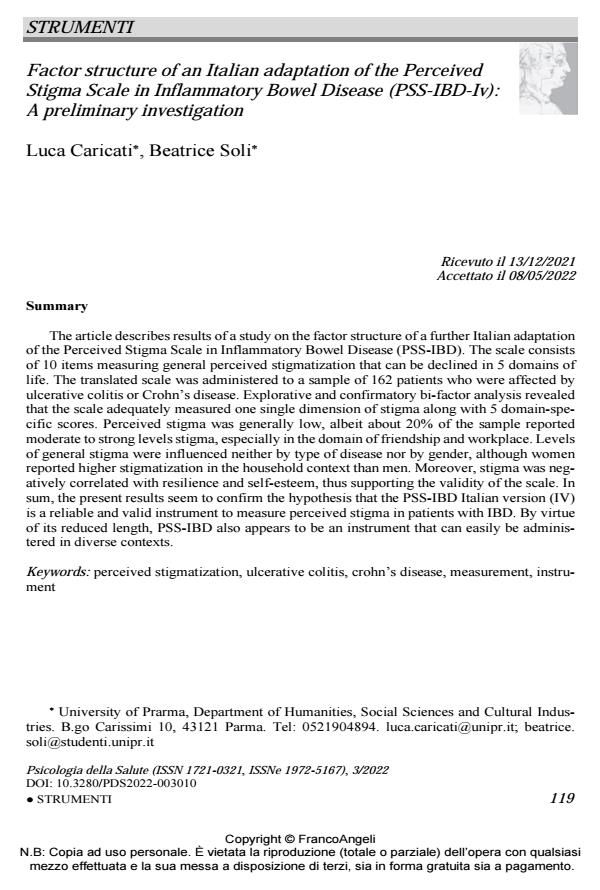Factor structure of an Italian adaptation of the Perceived Stigma Scale in Inflammatory Bowel Disease (PSS-IBD-Iv): A preliminary investigation
Journal title PSICOLOGIA DELLA SALUTE
Author/s Luca Caricati, Beatrice Soli
Publishing Year 2022 Issue 2022/3
Language English Pages 17 P. 119-135 File size 270 KB
DOI 10.3280/PDS2022-003010
DOI is like a bar code for intellectual property: to have more infomation
click here
Below, you can see the article first page
If you want to buy this article in PDF format, you can do it, following the instructions to buy download credits

FrancoAngeli is member of Publishers International Linking Association, Inc (PILA), a not-for-profit association which run the CrossRef service enabling links to and from online scholarly content.
The article describes results of a study on the factor structure of a further Italian adaptation of the Perceived Stigma Scale in Inflammatory Bowel Disease (PSS-IBD). The scale consists of 10 items measuring general perceived stigmatization that can be declined in 5 domains of life. The translated scale was administered to a sample of 162 patients who were affected by ulcerative colitis or Crohn’s disease. Explorative and confirmatory bi-factor analysis revealed that the scale adequately measured one single dimension of stigma along with 5 domain-specific scores. Perceived stigma was generally low, albeit about 20% of the sample reported moderate to strong levels stigma, especially in the domain of friendship and workplace. Levels of general stigma were influenced neither by type of disease nor by gender, although women reported higher stigmatization in the household context than men. Moreover, stigma was negatively correlated with resilience and self-esteem, thus supporting the validity of the scale. In sum, the present results seem to confirm the hypothesis that the PSS-IBD Italian version (IV) is a reliable and valid instrument to measure perceived stigma in patients with IBD. By virtue of its reduced length, PSS-IBD also appears to be an instrument that can easily be administered in diverse contexts.
Keywords: perceived stigmatization, ulcerative colitis, crohn’s disease, measurement, instrument
Luca Caricati, Beatrice Soli, Factor structure of an Italian adaptation of the Perceived Stigma Scale in Inflammatory Bowel Disease (PSS-IBD-Iv): A preliminary investigation in "PSICOLOGIA DELLA SALUTE" 3/2022, pp 119-135, DOI: 10.3280/PDS2022-003010